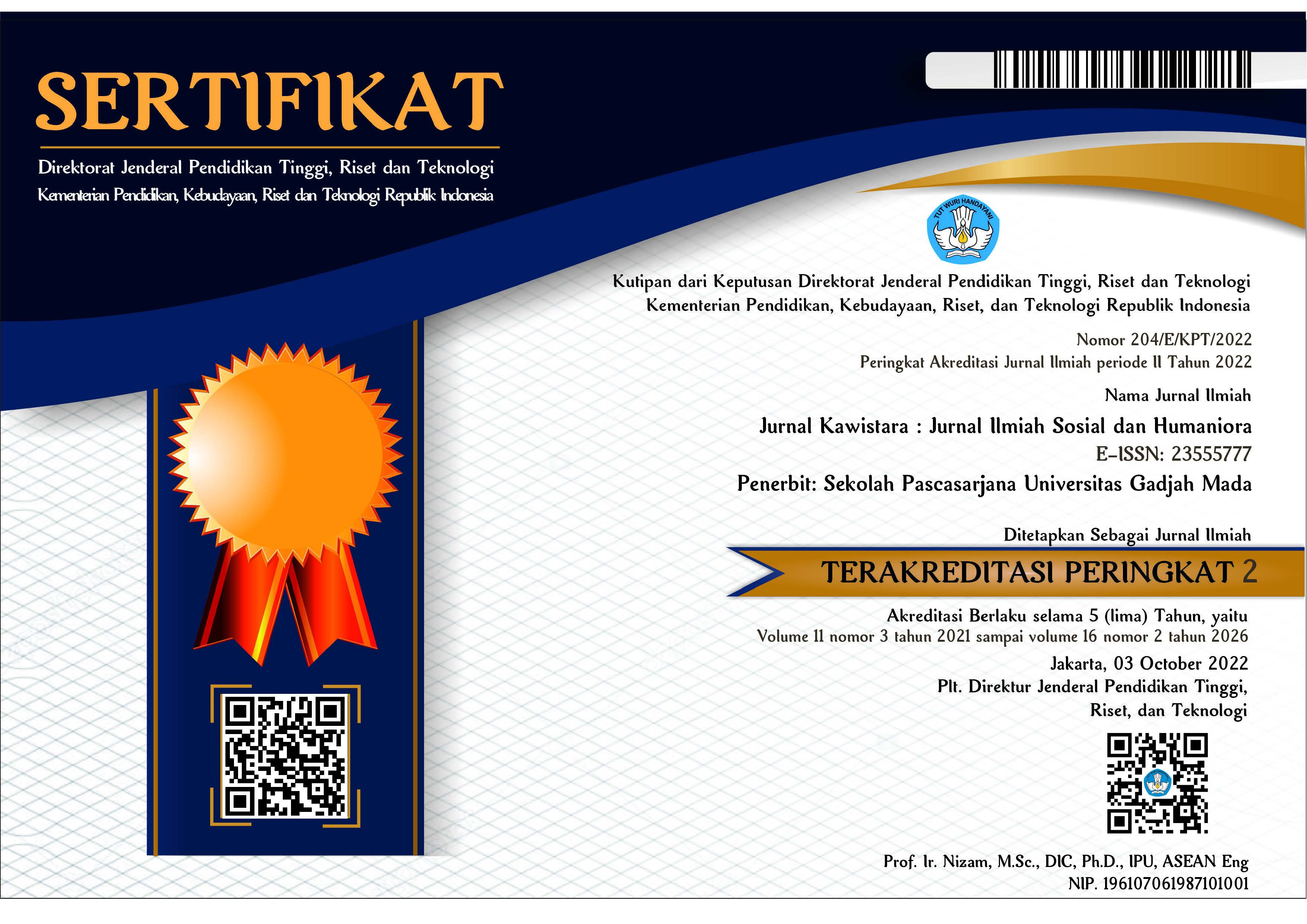“Si beau ma queen”: The Speech Construction of Queer Identity Perception in French Social Media
Aprillia Firmonasari(1*)
(1) Program Studi Sastra Prancis, Fakultas Ilmu Budaya, Universitas Gadjah Mada
(*) Corresponding Author
Abstract
Keywords
Full Text:
PDFReferences
Académie française (2020). Le covid 19 ou La covid 19 Académie française, Académie française. Available at: https://www. academie-francaise.fr/le-covid-19- ou-la-covid-19 (Accessed: 25 June 2021).
Allport, G.W. (1954). The nature of prejudice. Cambridge: Addison-Wesley Publishing Company.
D’Anglure, B.S. (2012). ‘Le « troisième genre »’, Revue du MAUSS, n° 39(1), pp. 197–217. Available at: https:// www.cairn.info/revue-du-mauss[1]2012-1-page-197.htm (Accessed: 26 September 2021).
Calindere, O. (2010). L’identité nationale et l’enseignement de l’histoire. Analyse comparée des contributions scolaires à la construction de l’identité nationale en France et Roumanie (1950- 2005). Dissertation. Université Montesquieu - Bordeaux IV ; Institut d’études politiques de Bordeaux ; SPIRIT. Available at: https://tel. archives-ouvertes.fr/tel-00547326 (Accessed: 12 August 2021).
Carroll, L., Barton, H. and Power, A. (2018). ‘Homophobic Words, Face to Face and Online: An emotional hit and run’, in Power, A. (ed.) Cyberpsychology and Society. London: Routledge.
Chasseguet-Smirgel, J. (2005). ‘Le “queer”’, Le Carnet PSY, 100(5), pp. 37–39. Available at: https://www.cairn. info/revue-le-carnet-psy-2005-5- page-37.htm (Accessed: 12 August 2021). Costelloe, L. (2014) ‘Discourses of sameness: Expressions of nationalism in newspaper discourse on French urban violence in 2005’, Discourse & Society, 25(3), pp. 315–340. doi:10.1177/0957926513519533.
Dawson, C. (2014). ‘Social media and minority languages: convergence and the creative industries’, Journal of Multilingual and Multicultural Development, 35(6), pp. 630–631. doi :10.1080/01434632.2014.914330.
De Fina, A., Schiffrin, D. and Bamberg, M. (2006). ‘Introduction’, in De Fina, A., Schiffrin, D., and Bamberg, M. (eds) Discourse and Identity. Cambridge: Cambridge University Press (Studies in Interactional Sociolinguistics), pp. 1–24. doi:10.1017/ CBO9780511584459.001.
Frost, D.M., Meyer, I.H. and Schwartz, S. (2016). ‘Social support networks among diverse sexual minority populations’, American Journal of Orthopsychiatry, 86(1), pp. 91–102. doi:10.1037/ort0000117.
Hardt-Mautner, G. (1995). ‘“How does one become a good European?”: the British press and European integration’, Discourse & Society, 6(2), pp. 177–205. Available at: https:// www.jstor.org/stable/42887974 (Accessed: 12 August 2021).
Nicholas, L. (2019). ‘Queer ethics and fostering positive mindsets toward non-binary gender, genderqueer, and gender ambiguity’, International Journal of Transgenderism, 20(2–3), pp. 169–180. doi:10.1080/15532739.2018. 1505576.
Rabb, N., Fernbach, P.M. and Sloman, S.A. (2019). ‘Individual Representation in a Community of Knowledge’, Trends in Cognitive Sciences, 23(10), pp. 891– 902. doi:10.1016/j.tics.2019.07.011.
Reeser, T.W. (2013). ‘“TransFrance”’, L’Esprit Créateur, 53(1), pp. 4–14. doi:10.1353/ esp.2013.0007. Statista Research Department (2019) Orientation sexuelle des Français 2019, Statista. Available at: https://fr.statista.com/ statistiques/1022904/ventilation[1]par-sexualite-france/ (Accessed: 21 June 2021).
Stets, J.E. and Burke, P.J. (2005). ‘New Directions in Identity Control Theory’, in R. Thye, S. and J. Lawler, E. (eds) Social Identification in Groups. West Yorkshire: Emerald Group Publishing Limited (Advances in Group Processes), pp. 43–64. doi:10.1016/S0882-6145(05)22002-7.
Udasmoro, W. and Nurwidyohening, W. (2006). ‘Seksisme Dalam Bahasa Prancis: Konstruksi Sosio-Historis Dan Politis’, Humaniora, 18(2), pp. 148–156. doi:10.22146/jh.872.
van Dijk, T.A. (2002). ‘Political discourse and political cognition’, in Chilton, P. and Schäffner, C. (eds) Politics as Text and Talk. Amsterdam: John Benjamins Publishing Company, Available at: https://www.jbe-platform.com/ content/books/9789027296979- dapsac.4.11dij (Accessed: 12 August 2021).
van Dijk, T.A. (2006). ‘Ideological discourse analysis’, Journal of Political Ideologies, 11(2), pp. 115–140. doi:10.1080/13569310600687908. France24 and AFP (2019) French more accepting of LGBT people but clichés persist, survey says, France 24. Available at: https:// www.france24.com/en/20190626- french-study-more-accepting-lgbt[1]but-cliches-persist (Accessed: 21 June 2021).
Wills, T.A. and Ainette, M.C. (2012). ‘Social networks and social support’, in Handbook of health psychology, 2nd ed. New York, NY, US: Psychology Press, pp. 465–492.
Zuma, B. (2014). ‘Contact theory and the concept of prejudice: Metaphysical and moral explorations and an epistemological question’, Theory & Psychology, 24(1), pp. 40–57. doi:10.1177/0959354313517023.
Article Metrics
Refbacks
- There are currently no refbacks.
Copyright (c) 2021 Aprillia Firmonasari

This work is licensed under a Creative Commons Attribution-ShareAlike 4.0 International License.
Jurnal Kawistara is published by the Graduate School, Universitas Gadjah Mada.







